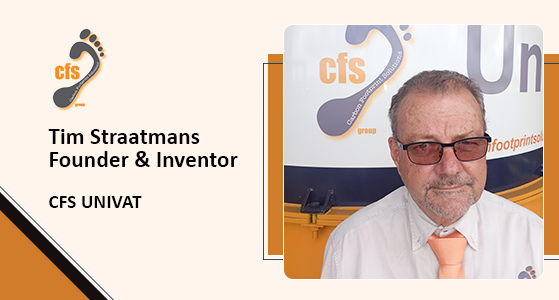
Water, Reinvented: The Bold Simplicity of UNIVAT
Carbon Footprint Solutions Group’s Bold Reimagination of Water Treatment
In a world full of environmental challenges and complex industrial systems, Carbon Footprint Solutions Group (CFS) is doing something refreshingly different. They’re not just innovating—they’re simplifying. And they’re proving that small, smart steps can lead to massive impact.
At the heart of their work is the CFS-UNIVAT System, a compact and intelligent unit that’s changing how we think about water treatment. It’s not a bulky, chemical-heavy machine. It’s a lean, off-grid-ready, self-optimizing system that’s built to work in the real world—whether that’s a remote mining site, a flood-stricken village, or anywhere in between.
“We started by questioning the basics,” says Tim Straatmans, founder and director of CFS-UNIVAT. “Why does water treatment have to be so big, expensive, and complicated?”
That one question set the foundation for everything that followed.

From Big Assumptions to Small Wonders
For decades, industrial water treatment was seen as a job for sprawling infrastructure, complex plumbing, and highly trained specialists. CFS didn’t buy into that. They believed that effective solutions could be smaller, smarter, and more accessible. That mindset led to the creation of the UNIVAT: a one-tank, modular unit that uses real-time data, adaptive filtration, and renewable energy to do what most systems need multiple machines (and people) to handle.
“We weren’t trying to make the old model better,” Tim explains. “We wanted to create a whole new way of thinking about water.”
Turning Waste into Value
One of the most exciting parts of the UNIVAT system is how it redefines “waste.”One of the Coal-Loading Terminals in Gladstone Harbour has engaged CFS to offer the Univat Technology for the treatment of the hundreds of tonnes of coal fines generated by current handling practises, at the same time, separating and reusing the now clean water for dust suppression and site washdownsal
“We’re not just reducing waste,” says Tim. “We’re creating new value from things people used to throw away.”
That means lower costs for companies, cleaner operations, and far less environmental strain. And because the system is portable and modular, it can move between zones as needed—maximizing its impact wherever it’s placed.


A Team That Thinks Differently
Behind the tech is a leadership team that’s just as innovative as the system itself. Tim brings deep industrial experience to the table, but the magic really happens in the collaboration.
The finance team keeps everything sustainable—making sure growth doesn’t outpace resources. The legal team, with its roots in climate and environmental law, helps the company go beyond compliance and into leadership. The admin and operations staff make sure things get done on time, on budget, and in the real-world conditions where it matters most.
“We don’t work in silos,” Tim says. “Everyone here is part of the solution. That’s how we’ve always operated.”
It’s a culture built on respect, transparency, and the idea that every voice matters—something that’s reflected in both their internal dynamics and how they work with clients.
Built for Places That Need It Most
What makes the UNIVAT system truly special is how versatile it is. It’s not just made for industrial zones. It can be deployed in remote communities, off-grid farms, or even disaster areas—places where access to clean water is most urgent.
Powered by solar or wind energy and fully self-contained, the system also comes with Starlink connectivity so it can be monitored and adjusted from anywhere. It even includes USB ports and computer access, turning it into a lifeline for communities during crises.
“Clean water is essential, but so is communication,” Tim says. “When you combine both, you give people real tools to recover and thrive.”
This humanitarian potential has drawn attention from aid organizations and governments alike—and it’s just one more reason the UNIVAT is more than a machine. It’s a movement.
Earning Trust Through Action
Of course, change isn’t always welcomed with open arms. “Some of our biggest challenges haven’t been technical,” Tim admits. “They’ve come from people being used to the old way of doing things.”
To overcome that, CFS leans into transparency and third-party validation. Every system is tested through NATA-accredited labs, and clients are encouraged to review the performance data themselves.
“We don’t do smoke and mirrors,” Tim says. “We show the data. We stand by our results. And we invite anyone to see it for themselves.”
One moment that stands out was a live demo for a city council. As they fed dirty, chemical-laden water into the system, the room watched in silence as crystal-clear water came out just seconds later. Then came the applause. “That’s when we knew we weren’t just talking innovation—we were living it,” Tim recalls.
What’s Next: Making Clean Water Everywhere, for Everyone
Looking ahead, CFS is preparing to scale. The next generation of UNIVAT units will be even more autonomous, robust, and globally deployable. The goal? To make clean water available anywhere, instantly—without relying on massive infrastructure or complicated logistics.
For Tim and his team, the vision goes beyond technology. It’s about making sustainability practical, empowering people with real tools, and leaving a legacy of thoughtful, inclusive change.
“Innovation doesn’t have to be loud,” he says. “It just has to work—and make people’s lives better.”
And that’s exactly what Carbon Footprint Solutions Group is doing. One smart system at a time.
To know more about Tim Straatmans, Founder and Inventor and CFS-UNIVAT, please visit https://www.carbonfootprintsolutions.com/


Company Name : CFS UNIVAT
Website : https://www.carbonfootprintsolutions.com
Management Team
Tim Straatmans | Founder and Inventor



